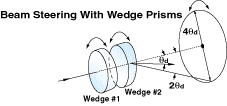|
Wedge prisms deviate an incident beam at a precise angle. Two wedge prisms of equal power can be combined to create a beam-steering apparatus that can place a beam anywhere within a cone defined by the deviation angle. Wedge prisms can be used individually to deviate a laser beam a set angle, or two wedge prisms can be used together as an anamorphic pair. A single prism's ability to deviate the angle of an incident beam is measured in Diopters with 1 diopter deviating the beam 1cm at a 1m working distance. |
 |
||
|
Two wedge prisms can be used as an anamorphic pair for beam shaping (to correct the elliptical shape of diode outputs). Or, a pair of wedge prisms can steer a beam anywhere within a circle described by the full angle 4θ, where θ is the deviation from a single prism. This beam steering is accomplished by rotating the two wedge prisms independently of each other, and is typically used to scan a beam to different locations in imaging applications. |
|||
|
The most common application for a wedge is found in automobiles: the day/night rearview mirror is a wedged mirror. Its principle of operation is the separation of reflections from its first and second surfaces, and it can be rotated with the flick of a switch to reduce the glare of headlights coming from behind. A wedge can separate reflections from its two polished surfaces because they are not parallel to each other. The wedge angle defines the inclination of the first surface to the second. The angular separation between the two reflections is twice the wedge angle. |
|||
|
|||
|
The wedge is a simple element with great versatility. It can be adapted to many applications by choice of its wedge angle and coatings for its inclined, polished surfaces. Sometimes it is used for its reflective capability, sometimes for its refractive power, and sometimes for its dispersive power. |
|||
Wedge


